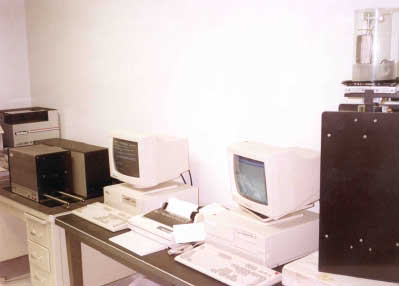Abrasion Testing
Accelerated Life Testing
Chemistry Laboratory
Computer Modeling
Salt Spray Testing
Density
Electrical Properties
Electron Microscopy
Experimental Foundry
Failure Analysis
Hardness Laboratory
Heat Treatment Studies
Light Microscopy
Lubrication Testing
Machine Shop
Materials Databases
Mechanical Testing
Metallography
Paint & Coatings
Product Testing
Rolling Mill
Thermal Testing
Thermal Testing Laboratory
Touchstone is equipped with dilatometers that measure a material’s coefficient of thermal expansion (CTE) within the thermal range of -50o C to +500o C.

Coefficient of Thermal Expansion (CTE) – ASTM E 228 and ASTM D 696
Tests can be conducted to ASTM E228 and ASTM D696. Typical sample lengths are 2 to 4 inches and are less than 0.5 inches in diameter. Samples can be heated at a single programmed linear rate or in multiple ramping and equilibrium steps to simulate service conditions of the material. The dilatometers are calibrated using materials, such as sapphire or quartz, which are appropriate to the temperature range of interest. Data reported includes the materials linear expansion and its instantaneous and average CTE through the tested temperature range.
References: ASTM E228 – Standard Test Method for Linear Thermal Expansion of Solid Materials With a Push-Rod Dilatometer; ASTM D696 – Standard Test Method for Coefficient of Linear Thermal Expansion of Plastics Between -30°C and 30°C With a Vitreous Silica Dilatometer.
Differential Scanning Calorimeter (DSC)
Differential scanning calorimetry is used to study changes in enthalpy as a material is heated. This allows accurate determination of temperature of thermal events, such as:
- Glass transition temperatures of polymers
- Melting points
- Phase transformations
- Curie point transitions
- Reactions (including decomposition, devolatilization, crosslinking, etc.)
The heat liberated or consumed during these events, such as heat of fusion and heats of reaction, can also be accurately determined, as can specific heat capacity.
These parameters are very useful in the design of heat treatment schedules as well as insulation/heating power requirements for processes.
Touchstone’s differential scanning calorimeter can be run under inert or oxidizing atmospheres at ambient pressure.

